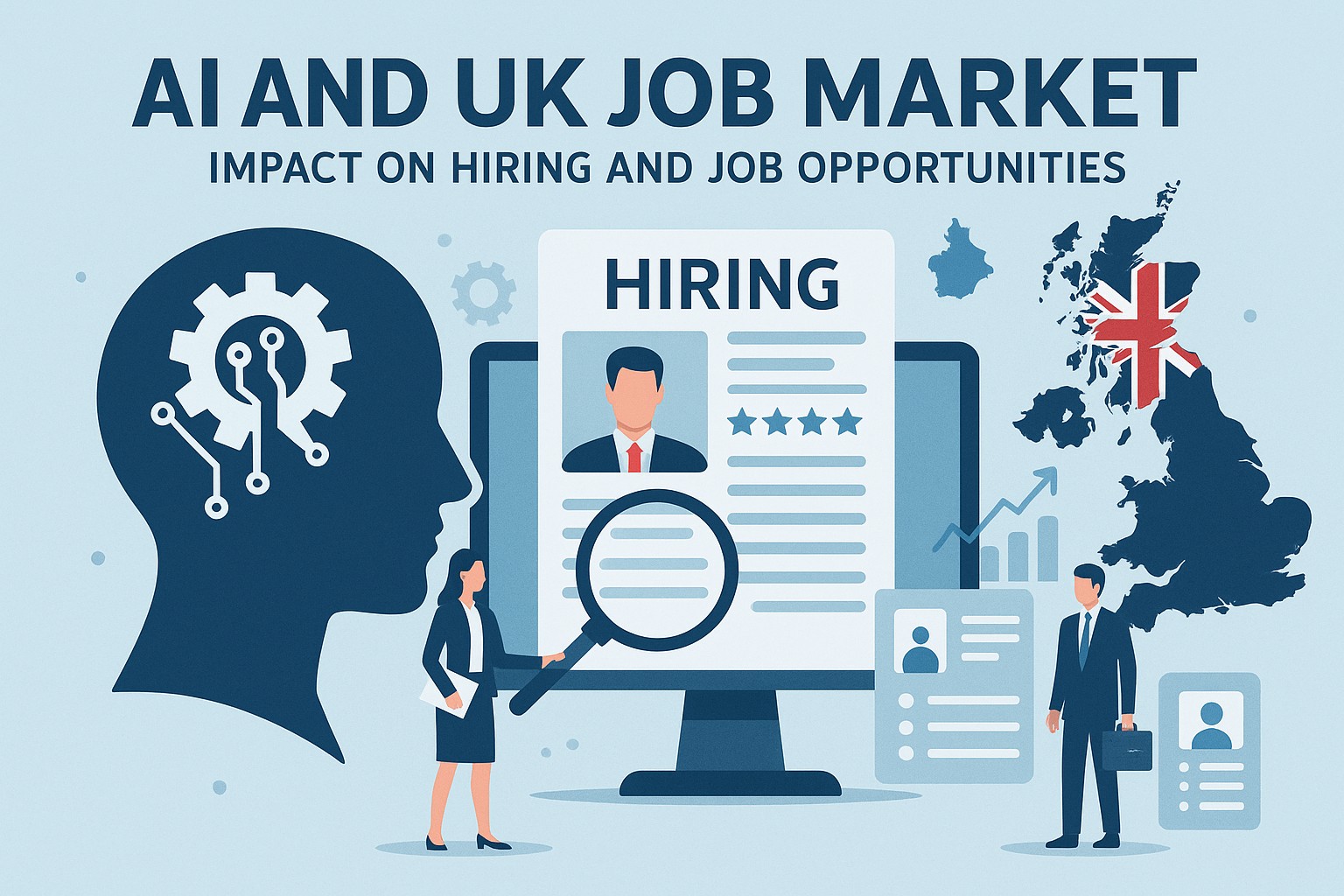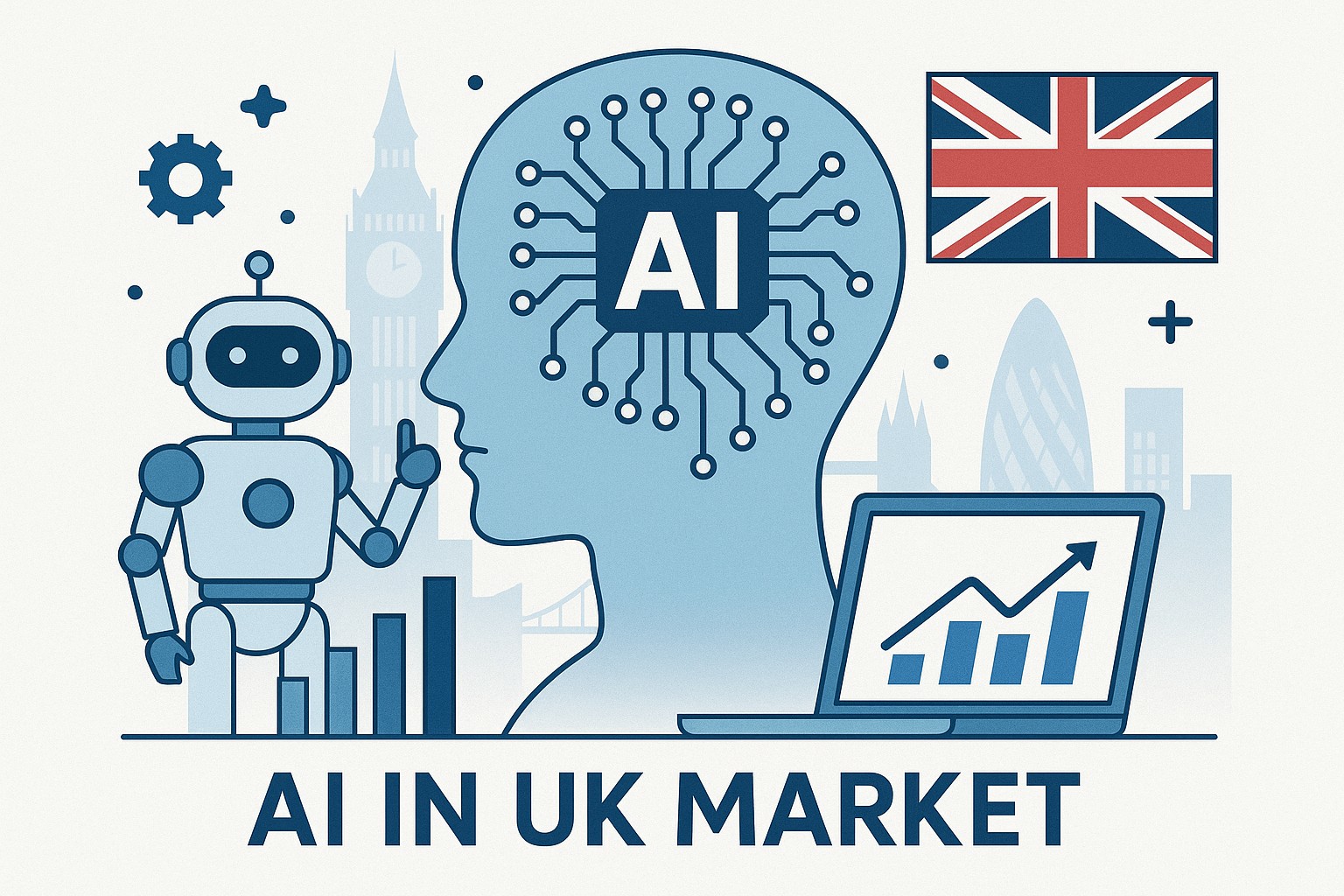AI and UK job market are undergoing a dramatic transformation, impacting various sectors, especially tech and finance. The integration of artificial intelligence (AI) into the workforce is reshaping hiring practices and job availability, with a particularly hard hit on white-collar and entry-level roles. Let’s explore how AI is revolutionizing the job market and what it means for both job seekers and businesses.
AI and UK Job Market: The Rise of Automation in Hiring
AI and UK job market trends have shifted dramatically over recent years, as more companies are incorporating AI tools to automate hiring processes and make operations more efficient. AI technology has found applications in various industries, reducing the need for human intervention in routine tasks. This has especially impacted the tech sector, where AI tools now screen candidates, analyze resumes, and even conduct preliminary interviews.
According to a report by TechInAsia, AI’s role in hiring is expected to grow, with businesses increasingly relying on it for more precise and data-driven recruitment practices. However, while AI improves efficiency, it is also reshaping the types of roles available to workers.
AI and UK Job Market: A Threat to White-Collar Jobs?
AI and UK job market disruptions are particularly evident in the white-collar sector. The use of AI in decision-making and data analysis has reduced the demand for professionals in roles like accounting, finance, and management. As businesses adopt AI for tasks such as data entry, financial forecasting, and customer service, many workers are facing job displacement.
According to the Business Standard, a growing number of white-collar jobs are being automated, making it harder for individuals in these positions to stay competitive in the job market. AI’s ability to handle repetitive tasks with precision has forced employees to focus on more strategic and creative roles, shifting the demand away from routine administrative work.
AI and UK Job Market: Impact on Entry-Level Positions
AI and UK job market shifts are also affecting entry-level positions across industries. The introduction of AI-powered chatbots, automation tools, and customer service systems has decreased the number of jobs available for entry-level candidates. Entry-level workers traditionally filled roles in customer service, administrative support, and sales. However, as AI tools become more sophisticated, they are increasingly performing these tasks, resulting in fewer opportunities for new graduates and young professionals entering the workforce.
The Economics Times highlights that companies are now looking for candidates who possess AI skills, data analysis expertise, and an understanding of automation systems. As a result, those without these technical skills are struggling to find suitable entry-level jobs.
AI and UK Job Market: How Companies Are Adapting
AI and UK job market shifts have led companies to rethink their hiring strategies. Many organizations are now focusing on developing a hybrid workforce, where human employees collaborate with AI tools to drive productivity. While AI takes on routine tasks, human workers are focusing on more complex, creative, and strategic initiatives. As a result, businesses are seeking employees who possess both technical expertise in AI and the ability to collaborate with AI systems.
For instance, AI technologies are being deployed to assist professionals in fields like finance, healthcare, and customer service. This allows companies to enhance efficiency and reduce costs, but also creates a demand for new skills. Workers are now required to be adaptable, willing to embrace technology, and capable of managing AI-driven processes.
AI and UK Job Market: The Decline in Hiring Rates
AI and UK job market trends are also evident in the declining rate of job postings in sectors most affected by automation. As businesses implement AI tools, the need for hiring increases at a slower pace. Tech and finance job postings, in particular, have seen a sharp decline as AI technologies take over tasks traditionally handled by humans. According to CityAM, some sectors in the UK have experienced up to a 38% drop in job postings due to the automation of roles previously reliant on human intervention.
Despite these challenges, there are still areas where AI is creating new opportunities. For example, roles in AI development, machine learning engineering, and data science have been on the rise. As organizations invest in AI technologies, they require skilled workers to build, implement, and maintain these systems.
AI and UK Job Market: Preparing for the Future
AI and UK job market transformations offer both challenges and opportunities. To stay competitive, job seekers must focus on acquiring new skills, particularly those related to AI, automation, and data analysis. As companies increasingly adopt AI in hiring processes, candidates with AI literacy and technical expertise will be in high demand.
Individuals can also enhance their prospects by engaging in online courses, certifications, and training programs related to AI technologies. Additionally, professionals in sectors affected by AI automation should focus on developing skills that AI cannot easily replicate, such as critical thinking, creativity, and leadership.
Conclusion
AI and UK job market changes represent a significant shift in the way businesses hire and how employees approach their careers. While AI has streamlined hiring practices and enhanced productivity, it has also led to job displacement in white-collar and entry-level roles. As AI continues to evolve, the job market will continue to adapt, and workers must stay proactive in acquiring new skills to thrive in this rapidly changing environment.


